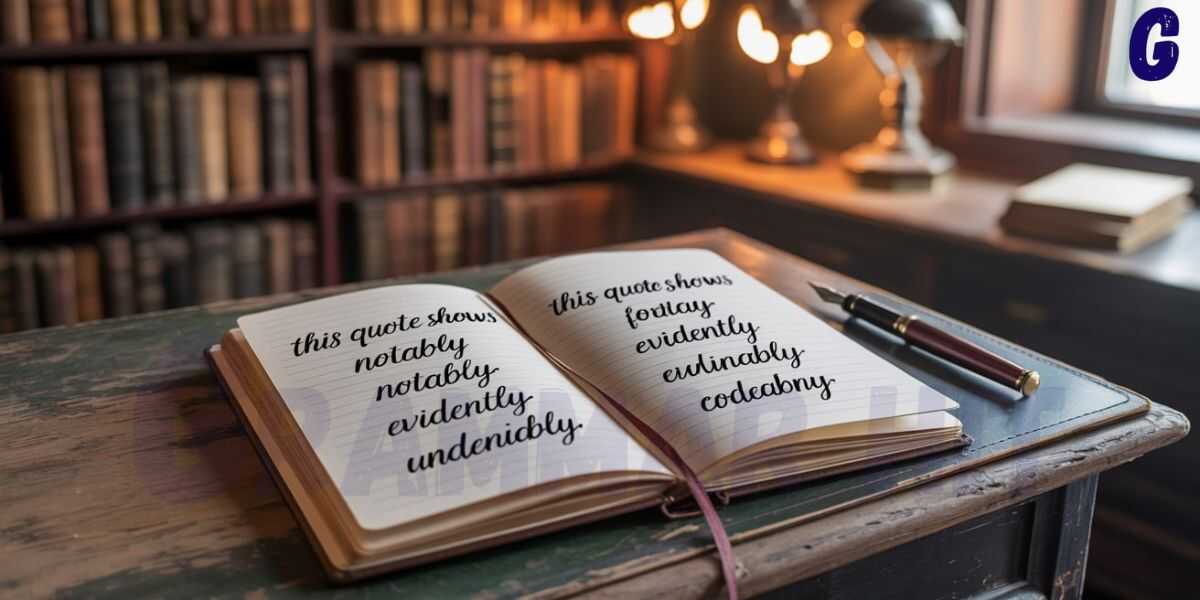Smarter Ways to Say “This Quote Shows” in Essays. Academic writing often falls into predictable patterns, and one of the most overused phrases you’ll encounter is “this quote shows.” While functional, this phrase lacks the sophistication and precision that distinguishes exceptional essays from mediocre ones. Professional writers and scholars understand that analytical vocabulary can transform ordinary text analysis into compelling scholarly discourse.
Whether you’re crafting a literature review, preparing a research paper, or developing critical analysis for your professor, these alternative phrases will elevate your academic writing skills and demonstrate your command of scholarly expression. Let’s explore ten sophisticated ways to introduce and analyze quotations that will make your essays stand out.
Understanding the Power of Precise Language
Before diving into specific alternatives, it’s crucial to understand why writing vocabulary matters in academic contexts. When you repeatedly use “this quote shows,” you’re missing opportunities to clarify, elucidate, and illuminate your analytical thinking. Each alternative phrase carries subtle differences in meaning, allowing you to be more precise about how evidence supports your arguments.
Professional writing terminology serves multiple purposes: it demonstrates your familiarity with academic discourse, helps you articulate complex ideas more clearly, and shows respect for your readers by providing them with engaging, varied language. These quote analysis terms will become essential tools in your scholarly toolkit.
The Quotation Illustrates
When you want to show how a quote provides a clear example or creates a vivid picture of your point, “this quotation illustrates” offers elegant precision. This phrase works particularly well when dealing with textual evidence presentation that paints a concrete image.
Email Scenario: Subject: Feedback on Your Research Draft
“Hi Marcus,
I’ve reviewed your paper on climate change communication. In paragraph three, where you write ‘Scientists must speak plainly to the public,’ this quotation illustrates the urgent need for accessible scientific discourse. Consider expanding on how this connects to your broader argument about science communication barriers.
Best regards, Dr. Sarah Chen”
This academic discourse marker proves especially valuable when analyzing literature, historical documents, or any text where imagery and metaphor play significant roles. It signals to your reader that you’re using the quote as a representative example rather than merely stating facts.
The Excerpt Demonstrates
“This excerpt demonstrates” carries stronger connotations of proof and evidence. When you need to show how a passage serves as concrete support for your argument, this phrase provides the analytical weight your essay writing expressions require.
Scenario: Peer Review Session
“During our workshop, Jennifer shared her analysis of workplace dynamics. When she quoted the manager saying, ‘We value collaboration over individual achievement,’ this excerpt demonstrates the company’s official stance on teamwork. However, Jennifer might explore whether employee experiences align with this stated value.”
This alternative phrase works brilliantly in research writing phrases where you’re building a case through accumulated evidence. It suggests that your quotation isn’t just relevant—it’s probative and substantive.
The Passage Reveals

Sometimes quotations uncover hidden truths or expose underlying assumptions. “The passage reveals” signals to your reader that you’re offering insight beyond surface-level interpretation. This phrase excels in critical analysis language where you’re excavating deeper meanings.
Text Message Exchange: Alex: “How’s your psychology paper coming along?” Taylor: “Great! I found this quote from Freud about dreams. The passage reveals his belief that unconscious desires manifest symbolically, which perfectly supports my argument about psychological interpretation methods.”
This analytical vocabulary choice indicates sophisticated textual analysis that goes beyond obvious conclusions. It’s particularly effective when discussing literary criticism or philosophical texts where multiple layers of meaning exist.
The Citation Highlights
When you want to draw attention to particularly crucial evidence, “this citation highlights” functions like a scholarly spotlight. This phrase works excellently in academic writing where you need to emphasize key supporting material.
Conference Presentation Scenario:
“Professor Williams concluded her presentation by noting how recent studies show increased student engagement. When she stated, ‘Interactive learning environments boost retention by 40%,’ this citation highlights the quantifiable benefits of pedagogical innovation. The audience immediately grasped the significance of her research findings.”
This quote introduction phrase proves invaluable when you’re dealing with statistical evidence, expert testimony, or any quotation that serves as your strongest supporting material.
These Words Underscore
“These words underscore” adds emotional weight and emphasis to your analysis. When a quotation reinforces your argument with particular force, this phrase communicates that intensity to your readers.
Email to Study Group: “Hi everyone,
I’ve been analyzing the environmental policy document we discussed. When the senator declared, ‘Future generations will judge our climate actions harshly,’ these words underscore the moral urgency driving current legislation. This could be our strongest evidence for the ethics section of our group project.
See you Thursday, Rachel”
This academic communication tool works especially well with persuasive writing or when analyzing rhetorical strategies in political speeches, advertisements, or advocacy materials.
The Statement Evidences
“This statement evidences” carries legal and scientific connotations, making it perfect for formal academic writing where you’re building systematic arguments through evidence presentation.
Research Lab Meeting: “Dr. Martinez reviewed the interview transcripts with the team. When the participant mentioned, ‘Social media affects my sleep patterns,’ this statement evidences the connection between digital technology and circadian rhythms that our study hypothesized. We should include this in our preliminary findings.”
This scholarly writing phrase works particularly well in empirical research, case studies, or any context where you’re using quotations as data points in larger analytical frameworks.
The Excerpt Exemplifies
When a quotation serves as a perfect example of a broader pattern or principle, “this excerpt exemplifies” provides the precision your analytical reasoning requires.
Thesis Defense Preparation: Advisor: “How will you handle the committee’s questions about your methodology?” Student: “I’ll reference the participant who said, ‘The interview process felt collaborative, not invasive.’ This excerpt exemplifies the successful application of participatory research methods I advocated for in chapter two.”
This academic discourse marker proves invaluable when you’re synthesizing evidence or showing how individual cases represent larger phenomena.
The Quote Delineates
“The quote delineates” suggests that your chosen passage clearly outlines or defines boundaries around complex concepts. This phrase excels in theoretical discussions or conceptual analysis.
Book Club Discussion: “Maria pointed out how the author’s definition shaped the entire narrative. When he wrote, ‘Justice means equal opportunity, not equal outcomes,’ the quote delineates his philosophical position on social policy. This distinction becomes crucial for understanding the novel’s political themes.”
This analytical vocabulary choice signals sophisticated conceptual thinking and works particularly well in philosophy, political science, or theoretical frameworks.
These Lines Indicate
“These lines indicate” suggests that your quotation points toward or suggests conclusions without stating them explicitly. This phrase works well when you’re interpreting implicit meanings or drawing inferences.
Graduate Seminar: “During our discussion of Victorian literature, Professor Thompson highlighted a crucial passage. When Dickens wrote, ‘It was the best of times, it was the worst of times,’ these lines indicate the paradoxical nature of social progress during industrial revolution. The contradiction itself becomes the message.”
This literary analysis term proves especially valuable when dealing with ambiguous texts, poetry, or any writing where implicit meaning requires careful interpretation.
The Snippet Reflects
“This snippet reflects” suggests that your quotation mirrors or embodies larger cultural, social, or intellectual patterns. This phrase works beautifully in sociological analysis or cultural criticism.
Department Newsletter: “Student researcher Kevin Chen made an interesting observation during our weekly colloquium. Analyzing social media posts, he noted how users frequently write, ‘Living my best life.’ This snippet reflects contemporary culture’s emphasis on personal fulfillment and public performance of happiness.”
This writing technique proves particularly effective when you’re connecting individual texts to broader social phenomena or cultural trends.
Implementing These Alternatives Effectively
Successful academic communication requires more than just substituting one phrase for another. Consider these strategies for writing improvement:
Context matters tremendously. Choose phrases that match your discipline’s conventions and your argument’s tone. Scientific writing might favor “demonstrates” or “evidences,” while literary criticism might prefer “reveals” or “reflects.”
Vary your choices throughout your essay. Using the same alternative phrase repeatedly defeats the purpose of expanding your vocabulary enhancement. Create a natural flow by rotating between different options.
Consider your evidence’s strength. Stronger evidence deserves phrases like “demonstrates” or “evidences,” while supporting material might work better with “suggests” or “indicates.”
Conclusion
Mastering these smarter ways to say “this quote shows” will transform your academic writing from mundane to compelling. Each phrase offers unique connotations that can enhance your analytical precision and demonstrate your sophisticated understanding of scholarly discourse.
Remember that effective writing isn’t about using complicated language for its own sake—it’s about choosing the right words to communicate your ideas with clarity and precision. These analytical vocabulary choices will help you articulate complex arguments, engage your readers, and establish your credibility as a thoughtful scholar.
Practice incorporating these phrases into your draft writing, and you’ll soon find yourself naturally selecting the most appropriate expression for each analytical situation. Your professors, peers, and readers will notice the elevated quality of your textual analysis and argument development.

Grammar Hit is your trusted language companion, offering expert grammar tips, practical guides, and engaging resources to help you write and communicate with confidence and clarity.

